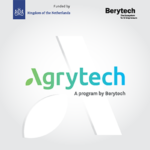
After a very challenging year, and despite the economic crisis and the global pandemic, seven startups from Batch III have successfully completed Berytech’s Agrytech Accelerator program and graduated.
The seven startups are working on innovative solutions to challenges in the agrifood sector covering the agrifood value chain from farm to fork. Smart Land is working on a smart irrigation and fertigation system, LUXEED Robotics is developing the first chemical-free weeding robot in the MENA region, GROUND ‐ Vertical Farming is providing a complete solution through fully automated vertical panels, and TheBeeHaus is working on a technology that allows the beekeepers to monitor apiaries, track bee progress and optimize honey production. MEZZMIX developed a new way to consume Garlic paste through a squeezable, bottom-up package. Through the value chain, FoodSight is helping SME food manufacturers in overcoming their food safety, while Karya is allowing users to explore experiential tourist activities with local small-scale producers in rural areas.
Berytech had called for applications for the third batch of candidates for the Agrytech Accelerator Program back in June 2019, and had received over a hundred applications, out of which 18 were admitted to the first phase of the program. At the end of this validation phase, 12 teams were shortlisted to join phase two of the program to develop their minimum viable product (MVP) and start getting traction. Eight startups were admitted to the third and final phase – the incubation phase, seven of which have now graduated.
“The program provides an understanding to the founders of what it entails to be an entrepreneur: from having the right mindset, to having a daily discipline, to developing a strategic thinking faculty – by being able to see, analyze, and understand the big picture, to having the right approach to things, one that favors quick testing, experimentation, results analysis, and making tweaks accordingly,” specifies Ramy Boujawdeh – Deputy General Manager of Berytech. The startups received experts’ follow-up and mentoring on how to scale their businesses after launching their product in the market.
The Incubation Phase
During the incubation phase – the last phase of the Agrytech Program, the startups work to further develop and perfect their product from a technical point of view, further validate with potential customers, and further develop their documentation including their investment teasers, pitch decks, and financial models in order to be ready to meet investors and start raising funds.
“The phase allows the startups to continue the technical development of their product, ensuring that the minimal viable product contains the features needed by the target market and testing its features with potential leads and early adopters. Startups work to get initial traction and to start scaling up. Also, during this phase, startups prepare their documentation, making sure they have all the supporting material that an investor might require (investment pitch deck, financial plan, business plan). Phase three wraps up with the teams prepared to meet investors, pitch their startup, negotiate their valuation, and raise funds,” explains Joelle Atallah, Investment Specialist in Berytech.
Startups in phase three had access to technical expertise, be it business related or product related. They also had access to markets, leads, potential customers, and specialized experts.
The phase included private and group interactions that enabled the growth of startups participating in the group incubation phase including workshops, meet-ups and clinics, tackling go-to-market, finance and investment readiness, pitching, access to markets, and legal, along with monthly review sessions (OKR sessions) to ensure that the startups were on the right path to achieve their goals.
Constantin Salameh – Senior Coach and Investment Advisor reflects on his experience with Batch Three: “It was a true pleasure to work with the selected startups and assist them on their investment readiness in preparation for their raising equity capital. The investment readiness program included specialized webinars on developing and pitching their investment deck, determining the valuation of their companies, selecting the right investors and negotiating a win-win term sheet while building a sound governance foundation. These webinars were followed by one-on-one investment clinics to adapt the learning to their specific situation.”
Local and International Activities
The startups were also exposed to a program of activities both locally and internationally. The teams participated in the Agri-food Innovation Day 2020 where they had the chance to pitch their solutions to an online audience.
Seven startups got access to Confideo Venture Mentoring – a service Powered by MIT and offered by IM Capital to support the growth of entrepreneurs in Lebanon. The service allows them to book sessions, as needed, with high-profile mentors with a wide experience and deep expertise in various industries and fields. The Confideo program remains open to the startups, even after their graduation from the Agrytech Program.
Due to the global pandemic, the soft-landing trip to the Kingdom of The Netherlands that is programmed for every batch in phase three was replaced by virtual sessions; but thanks to the virtual nature of the sessions, they were open to all seven finalists. The virtual soft-landing included a total of seven online workshops covering Ethics in Science, Patenting Innovative Ideas, Growth Marketing, Non-dilutive Funding for Agri-Food Startups, How to Do Business in Europe, How to Close VC Funding, and the success story of FUMI Ingredients – an agrifood startup in the Netherlands.
The virtual soft-landing also included connecting the startups to technical experts, entrepreneurs, and consultants based on their needs and the help they could benefit from.
Progress and Achievements
As the startups graduate the program most have generated initial traction, some are working on accessing new markets, some are on the way to raising investment, while all are in the process of setting up their organization structures and registering their companies.
“Two of the seven startups passed the Seeders pre-pitch and final pitch selection and completed the due diligence process with a final approval for their first equity funding from Seeders and direct business angels. More companies will follow the same route,” confirms Mario Ramadan – Accelerator Program Manager at Berytech.
Testimonials
“Starting phase one of the program in October 2019, in parallel with the Lebanese Revolution, was a push for us since we believe that change is needed, and it starts with each one of us building solutions answering the current problems.
During the first two months, we went through the process of turning our idea into a startup. We were able to have a deeper look into the market, the pain points of the food chain stakeholders and their needs, to validate our idea and to build a prototype. The high interest we received made us work even harder during phase two of the Accelerator Program.
The economic crisis affected the market level of responsiveness, but despite that, the lockdown gave us more time to better shape our idea in response to the COVID-19 pandemic as well, which stressed the need for our platform now more than before.
Given the current conditions we are living in, we had to revisit our business and revenue models, perform deeper market validation, test and get feedback from users on so many levels and at different stages, draw our startup’s sales and go-to-market strategies while developing our MVP and launching our marketing and traction campaigns.
During all this time, the Berytech team supported our startup’s early stages through education, mentorship, financing and investment readiness. The experience was a process of intense, rapid, and immersive education, accelerating the life cycle of our to-be company, compressing years of learning-by-doing into just a few months!” – Fidele Achkar, Co-founder of FoodSight.
“Without the Agrytech Accelerator, I would have been another engineer working maybe in a factory. Berytech, with the support of the Kingdom of the Netherlands, has given me the opportunity to start a company and be its founder and CEO. I was also able to provide job opportunities for three full-timers and 10 extras. Berytech’s financial grant was critical for our launch because it provided dollars where access to foreign currency made all the difference during 2020’s financial crisis.
Smart Land is a valuable solution for farmers to improve the quality and quantity of their crops while saving them money. A one-time investment in the solution will ultimately reduce their use on imported fertilizers and improve their exportability standards, giving them access to fresh funds.” – Khaled Abbas, Founder and CEO of Smart Land.
Rita Asmar co-founder of Ground Vertical Farming shared, “The Agrytech Accelerator was a turning point in the journey of Ground Vertical Farming as we turned our idea into a scalable solution. We started with just the idea a year ago, and today we have a product. We learned a lot from the advisors in the program, especially to build the technical aspect of our product. We passed through difficult times due to the COVID 19 pandemic and the financial crisis in the country, but the support we received from the Berytech team helped us grow and focus on our startup.”
The Agrytech Program
 Berytech designed and developed the Agrytech program to make sure Lebanon has the most competitive companies that are sourcing, solving, growing and transforming food, as well as feeding the world from Lebanon. The Agrytech Accelerator Program is under the ACT Smart Innovation Hub, a new out-of-the-box approach by Berytech, co-funded by the Kingdom of The Netherlands, aims at strengthening business advancement and job creation in the Agri-food and Cleantech sectors in Lebanon. Berytech supports innovations across these sectors by offering startups the resources, knowledge, support, and funding worth around $100K, necessary to scale their ideas and grow them to penetrate international markets. Learn more.
Berytech designed and developed the Agrytech program to make sure Lebanon has the most competitive companies that are sourcing, solving, growing and transforming food, as well as feeding the world from Lebanon. The Agrytech Accelerator Program is under the ACT Smart Innovation Hub, a new out-of-the-box approach by Berytech, co-funded by the Kingdom of The Netherlands, aims at strengthening business advancement and job creation in the Agri-food and Cleantech sectors in Lebanon. Berytech supports innovations across these sectors by offering startups the resources, knowledge, support, and funding worth around $100K, necessary to scale their ideas and grow them to penetrate international markets. Learn more.









